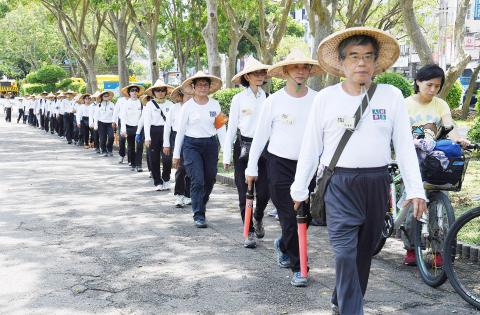About 40 members of the People Rule Foundation yesterday marched in Taipei in a silent appeal to President Tsai Ing-wen (蔡英文) to honor her promise to amend the Referendum Act (公民投票法) by the end of the year, which they said is an important step toward “normalizing” the nation.
Setting out in the morning from MRT Yuanshan Station, the marchers passed the Dadaocheng (大稻埕) area before reaching the Legislative Yuan, their final destination, concluding a walk of about 15km that lasted almost seven hours.
Wearing white T-shirts and bamboo hats, the marchers followed an approach the foundation described as “nonviolent protest,” walking in silence until they arrived in front of the legislature, where they rallied and shouted slogans.

Photo: CNA
Foundation chief executive officer Liu Ming-hsin (劉明新) called on lawmakers to swiftly pass a proposed amendment to the act, which passed its first reading in December last year.
The proposed amendment would lower the number of signatures required to decide the topic of a referendum — the first stage — from 0.5 percent to 0.0001 percent of the total number of eligible voters in presidential elections.
That would bring down the number of signatures needed in the first stage from about 94,000 to about 1,800.
For a signature drive that is held during the second stage of a referendum drive, the threshold for the second stage of a referendum drive to succeed would be brought down to 1.5 percent of the total number of eligible voters in a presidential election, from 5 percent, bringing the requirement down to about 280,000 signatures.
The proposal would abolish the stipulation that a referendum outcome is valid only if more than 50 percent of all eligible voters vote and the “yes” votes account for at least 50 percent of the total number of votes cast.
According to the draft amendment, the outcome of a referendum would be valid if one-fourth of all eligible voters cast a ballot and a majority of votes is in favor of the proposal.
The amendment also seeks to lower the voting age for referendums from 20 to 18.
If the proposed amendment is passed, it would give the nation an “amulet” that would allow the people to decide whether to amend the Constitution to grant Taiwan the status of a “normalized nation,” thereby defending it from the “bullying of foreign forces,” Liu said.
“By amending the act, we would be able to enlighten the public and return the power to decide on national affairs from lawmakers to the people, realizing true democracy,” Liu said.
He called on Tsai to honor her pledge and urged lawmakers to help the bill clear the legislative floor during the third extraordinary session starting on Aug 21 or the next legislative session starting in September.

The manufacture of the remaining 28 M1A2T Abrams tanks Taiwan purchased from the US has recently been completed, and they are expected to be delivered within the next one to two months, a source said yesterday. The Ministry of National Defense is arranging cargo ships to transport the tanks to Taiwan as soon as possible, said the source, who is familiar with the matter. The estimated arrival time ranges from late this month to early next month, the source said. The 28 Abrams tanks make up the third and final batch of a total of 108 tanks, valued at about NT$40.5 billion

Two Taiwanese prosecutors were questioned by Chinese security personnel at their hotel during a trip to China’s Henan Province this month, the Mainland Affairs Council (MAC) said yesterday. The officers had personal information on the prosecutors, including “when they were assigned to their posts, their work locations and job titles,” MAC Deputy Minister and spokesman Liang Wen-chieh (梁文傑) said. On top of asking about their agencies and positions, the officers also questioned the prosecutors about the Cross-Strait Joint Crime-Fighting and Judicial Mutual Assistance Agreement, a pact that serves as the framework for Taiwan-China cooperation on combating crime and providing judicial assistance, Liang

A group from the Taiwanese Designers in Australia association yesterday represented Taiwan at the Midsumma Pride March in Melbourne. The march, held in the St. Kilda suburb, is the city’s largest LGBTQIA+ parade and the flagship event of the annual Midsumma Festival. It attracted more than 45,000 spectators who supported the 400 groups and 10,000 marchers that participated this year, the association said. Taiwanese Designers said they organized a team to march for Taiwan this year, joining politicians, government agencies, professionals and community organizations in showing support for LGBTQIA+ people and diverse communities. As the first country in Asia to legalize same-sex

MOTIVES QUESTIONED The PLA considers Xi’s policies toward Taiwan to be driven by personal considerations rather than military assessment, the Epoch Times reports Chinese President Xi Jinping’s (習近平) latest purge of the Chinese People’s Liberation Army (PLA) leadership might have been prompted by the military’s opposition to plans of invading Taiwan, the Epoch Times said. The Chinese military opposes waging war against Taiwan by a large consensus, putting it at odds with Xi’s vision, the Falun Gong-affiliated daily said in a report on Thursday, citing anonymous sources with insight into the PLA’s inner workings. The opposition is not the opinion of a few generals, but a widely shared view among the PLA cadre, the Epoch Times cited them as saying. “Chinese forces know full well that